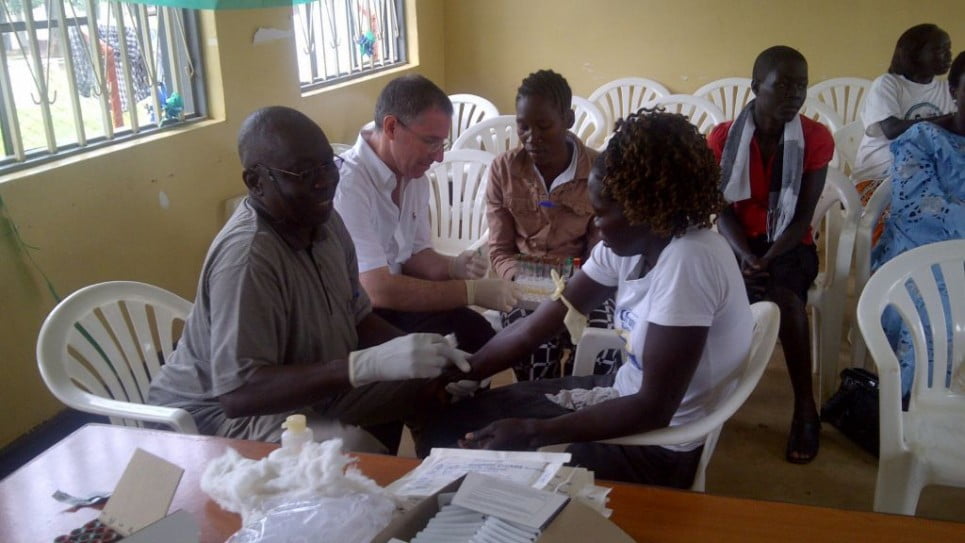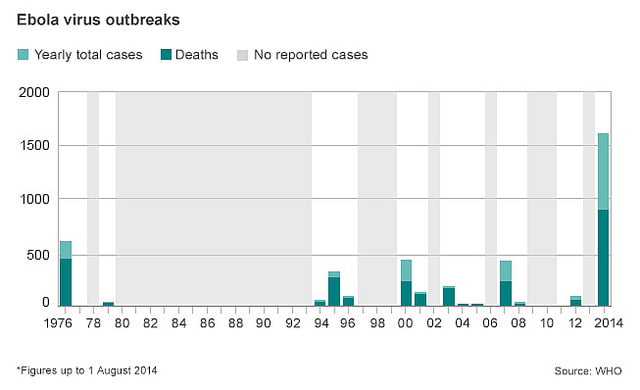AMAZING ISRAEL: EBOLA RESEARCH AND VACCINATION
http://nocamels.com/2014/08/how-israels-leading-ebola-expert-could-eradicate-the-disease-and-why-the-us-military-is-investing-in-him/
How Israel’s Leading Ebola Expert Could Eradicate The Virus And Why The US Military Is Investing In Him
Africa is currently facing its worst Ebola outbreak in history, with over 1,600 officially reported cases of infection, a death toll of 880 and rising, and a startling mortality rate of up to 90 percent.
One of the reasons that the Ebola virus is so deadly is that there is still no proven vaccine or treatment, and only a handful of researchers around the world are currently working on a cure. But while the World Health Organization (WHO) is busy raising $100 million for an emergency response plan, increasing numbers of people in West Africa are prone to or have already become infected with one of the most deadly and dangerous diseases.
So what’s really being done about a cure? Dr. Leslie Lobel, an Israeli researcher at Ben Gurion University and one the world’s few experts on the Ebola virus, is currently ahead of many of his international colleagues when it comes to discovering a vaccine that would make humans immune to the virus. But besides toting his own vaccine as the cure all and end all of the Ebola epidemic, Lobel has some interesting insight to impart on why this is the most serious outbreak in history.
The business of Ebola
According to Dr. Lobel, the present lack of interest in Ebola in medical circles is due to two main factors: big pharmaceutical companies not finding long-term treatments to regional viruses profitable, and the viral infections being overshadowed by more widespread diseases like cancer and diabetes. As Dr. Lobel tells NoCamels, “What has happened is that therapies have not been developed for infectious diseases for many years. Suddenly there’s an outbreak and people get scared. I think this is more of a wakeup call.”
Despite the fact that the United States has classified Ebola a ‘Category A’ potential bioterror agent, big pharmaceutical companies don’t deem an Ebola drug ‘profitable’, says Lobel, because according to their assessments, the disease affects a specific group of people in mainly impoverished countries with poor medical care. Therefore, these companies do not see profitable returns they would like for an Ebola cure, causing pharma executives to ask, “Who are they going to sell it to?”, as researcher Thomas Geisbert puts it.
SEE ALSO: Will Israeli Technology Put An End To Viral Disease?
The economical concerns of the pharmaceutical companies are what force Dr. Lobel and others to turn to other sources of research funding, like the United States Military. “One of the great Achilles Heels of any military is infectious disease,” explained Dr. Lobel. “I think the American military, in particular, is heavily invested in developing defenses against biological pathogens, both from nature and from potential bioweapons.” Lobel, Israel’s preeminent Ebola researcher, immigrated to the country in 2002 from the US, making it easier for him to gain the confidence of one of world’s only militaries (besides Canada) investing in an Ebola cure.
In the race for an Ebola vaccine and therapy, the competition is tough
Currently, doctors are using a US Military-grant funded passive Ebola therapy, the “cocktailed antibody method,” tested on monkeys and used to treat the two American aid workers infected with the virus. However, the success of this method is still not proven, but offers the best ‘local’ approach to treating the virus, according to Dr. Lobel.
Meanwhile, Dr. Lobel’s own passive therapy, developed together with his co-principal investigator Dr. Victoria Yavelsky, is the most promising option on the market for a long-term Ebola treatment. Applying human monoclonal antibodies, Dr. Lobel hopes that his vaccine will eventually be used to immunize against the deadly virus, a far-off dream for the Western African countries currently dealing with the epidemic.
To create the vaccine, Dr. Lobel and his research team travel to their partnering lab at the Uganda Virus Research Institute in Entebbe five times a year to take blood samples of healthy Ebola survivors. The patients that Dr. Lobel studies are Ebola survivors who managed to self-generate antibodies that effectively fought off the virus. By visiting with these survivors, who unfortunately are considered pariahs in African society due to their history of infection, Lobel not only seeks to isolate the antibodies in their blood for the development of his vaccine, but to make sure that they retain a sense of social self-importance fostered through his regular vists.
SEE ALSO: ‘Treatment Resistant’ Tumors Might Be Treatable After All
Dr. Lobel believes that his survivor blood-based method will prove most effective in immunizing against the disease, but it will take nearly five years until an early form of the vaccine is ready. For now, his method of treatment is still undergoing animal testing, but Lobel believes that there’s still time. According to his estimates, the recent breakout has been over exaggerated by the international press, which is why he provided us with a bit of perspective.
The news headlines of late tend to read grim, reinforcing the fact that this is the largest ever recorded outbreak of Ebola since its discovery in the Democratic Republic of the Congo in 1976. But Dr. Lobel finds its important to clear the air about why this Ebola outbreak spread so quickly, arguing that the poor security regimes of Western African countries like Sierra Leone, Guinea, Liberia and Nigeria are one of the factors to blame for the extent of the current epidemic. Because these countries have porous borders and do not have effective methods for quarantining the disease to wean it out, more and more people are infected and unknowingly spread the disease.
Still, a recent scare that air travel may be furthering the spread of Ebola after an infected passenger traveling from Liberia to Nigeria vomited in flight, has made many wonder whether Ebola is already on the move beyond Africa. According to both Dr. Lobel and the World Health Organization (WHO), it is not likely that even this record Ebola epidemic will lead to a global pandemic thanks to correct medical management and monitoring of the outbreak.
“Even if infected people travel to developed countries, they would be quarantined fast enough and cautions would be taken so that the disease wouldn’t really spread,” reassures Dr. Lobel, who was in East Africa when the breakthrough erupted in West Africa (approximately the same distance from Israel). “I really don’t think there are any worries of a pandemic; I think the fears here are way overblown.”
Dr. Lobel is a senior lecturer and Chair of the Department of Virology at Ben-Gurion University of the Negev, and his lab is located at the Center for Emerging Diseases, Tropical Diseases, and AIDS. In addition to studying Ebola, Dr. Lobel and his fellow researchers also focus on Marburg, another deadly hemorrhagic fever virus.
Photos: Centers of Disease Control and Prevention/ Courtesy of Dr. Lobel/ Dani Machlis- Ben-Gurion University of the Negev/ AJ Cann
Comments are closed.


